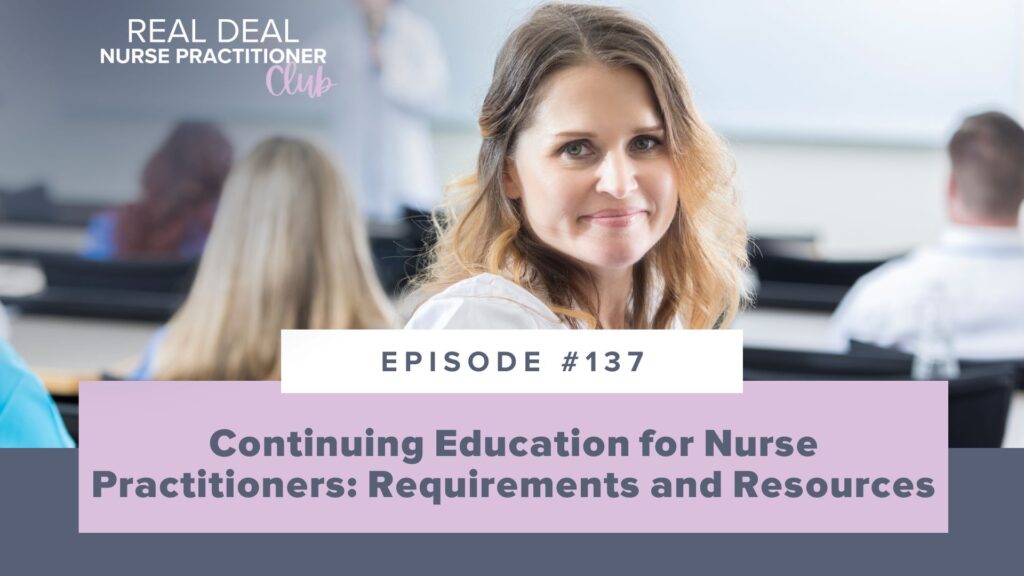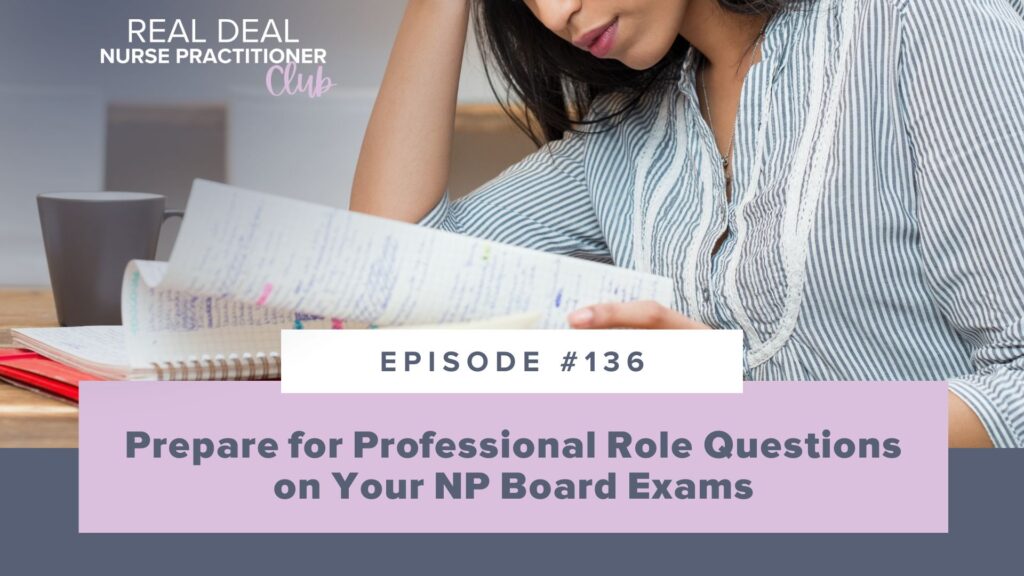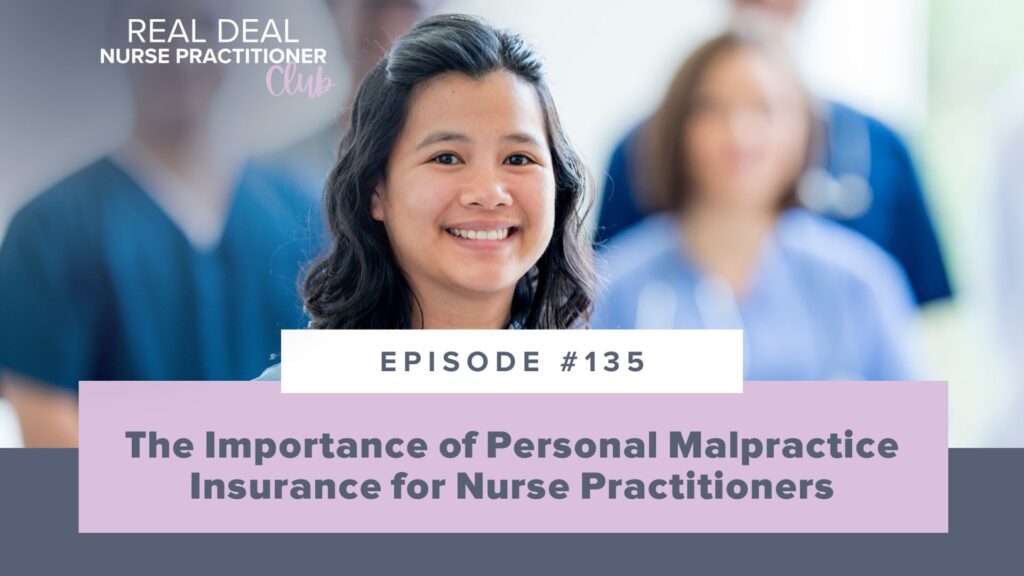
Are you finding yourself in a cycle of anxiety, overwhelm, and confusion in your board prep? If so, you’re in the right place. I recently reached out to my student community to ask what all of you are struggling with and the clarity you’re looking for on your NP journey, and in this episode, I’m compiling the answers I received.
The reality is that school just doesn’t give us enough guidance on the topics we’re discussing today. You get to the end of NP school, ready to leave the nest and start your professional life, and this is where so many students often find themselves confused and swimming in self-doubt. So today, I’m giving you a little additional guidance to help you along.
If board prep is burning you out and leaving you extremely anxious, tune in this week! My goal today is to demystify the process and give you my take on the most frequently asked questions because I know you’ve absolutely got it in you to become a real-deal NP.
I have communities available for both students and new nurse practitioners. In these communities, we work to uplift one another and grow this profession together every single day. If this kind of support is what you need, I invite you to join! Click here if you’re a student, and click here if you’re a new NP.
What You Will Discover:
- When to start preparing for your board exam, depending on how anxious you’re feeling.
- How long you should be studying for in preparation for your exam.
- When and how to apply for your license.
- How many practice questions you should be doing as a bare minimum.
- My take on whether you should take both exams.
- How you’ll know when you’re ready to test.
- The biggest differences between AANP and ANCC.
- How to choose the best review course for you.
Featured on the Show:
- If you’re looking for extra support, I have communities available for both students and new nurse practitioners. Click here if you’re a student, and click here if you’re a new NP!
- Ep #9: AANP vs ANCC: Which Exam Should I Take?
Full Episode Transcript:
Welcome to Becoming a Stress-Free Nurse Practitioner, a show for new NPs and students that want to pass their board exam the first time and make that transition from RN to NP as seamless as possible. I’m your host Sarah Michelle. Now, let’s dive into today’s episode.
Hey, hey, my friends. Today, I’m going to walk you through a series of frequently asked questions from my student community. I recently made a post and asked you guys what you wanted to know the most. And I’m going to compile my answers into this episode for you.
I know that preparing for boards can be highly anxiety inducing, and honestly a little confusing. But the goal of today’s episode is to demystify the process a little bit and get you as ready as possible to become a real deal nurse practitioner.
I feel like part of the reason I even need to do this episode is because I feel like schools don’t give a lot of guidance on some of these topics that we’re going to be discussing.
It’s kind of like you get to the end of nurse practitioner school, and you’re a little baby bird in a nest. And they set you free on your own when you graduate. And you’re like, “Wait, do my wings work? Can I actually fly? How do I prepare? What’s next? Do I really know what I’m doing?”
And you absolutely do. I just want to give you a little additional guidance to help you along. And so with that, I’m just going to dive right in and start working through these questions for you so that you can leave this episode in the best mental space possible.
First question that I always get is when should I start preparing for my board exam? And this answer can vary just a little bit. For those of you who are a bit more anxious, or really anxious like I was, I typically suggest starting somehow in your last year of school.
So whether that looks like you buying a question app, or doing the course bundle for a month, and taking really great notes, or whatever really feels the most aligned with you. The reason that I suggest getting that head start while you’re in school if you’re anxious, is so that you won’t feel rushed at the end. And mentally, you’re going to feel as if you’re ahead of the game when it’s really time to start cracking down on board prep.
For those of you not in this anxious category, I would instead suggest two to three months before you plan to test. While you don’t have to intensively study for the entire two to three months, I absolutely do not suggest that, that does give you plenty of time to sort out your strengths and your weaknesses, and what you truly need to be focusing in on.
Which leads me to my next question, question two that I also get all the time. Which is how long should I study? This one is another one of those variable answers. But I personally feel that anything less than a month is just not long enough.
You need time to absorb and re-ingrain the material you have already learned in nurse practitioner school. And if you’re trying to do that in two weeks or less, sometimes it works and sometimes it doesn’t. So it’s really up to you if you’re willing to take that risk.
I usually find that the six to eight week mark of studying and preparation is really the sweet spot for most students. That truly gives you the time that you need to not only prepare, but also take those mental breaks as you need them too.
And y’all, those break days will absolutely be needed. And so don’t skip out on those along the way. And when you’re studying less than a month, it becomes really easy to skip the break days, and really overwhelm yourself, and really burn yourself out. Which is the very last thing that we want you to be doing before you walk into your exam.
Question three is, when and how should I apply for my license? This is definitely a loaded question. And please do not fault your school for not walking you through this because the majority of schools serve students in a multitude of states all across the nation. And therefore it’s difficult to provide guidance because every single state is different. Every single one of them.
So what I would do is reach out to your Board of Nursing directly. For example, I’m from Kentucky. And so I was able to start my licensing process online way before I ever tested, like a couple of months before. I did my background check, my fingerprints, et cetera. And then when I passed my exams ANCC and AANP sent over verification to the Kentucky Board of Nursing.
A lot of states will allow you to get a jump start like this and I highly suggest doing it If so. Because it expedites your license becoming active after you actually pass the exam. If your state will not allow you to do this, I would apply the second that you pass that exam and have that certification number available to you.
Licenses through your state can take weeks, and in some states, it can even take months. I’m looking at you California. And you absolutely want to be on top of that process so you can get into practice. Your best resource for these types of questions will always, always, always be your Board of Nursing. Hands down every time. Your Board of Nursing has all of the details and all of the resources you need to figure out your licensing process and what that looks like in your specific state.
And along those same lines, when you pass some day and have a question about practicing in your specific state your Board of Nursing should always be your first go-to resource. Guys, they have all the answers. You want to utilize your Board of Nursing.
And make sure too, I want to add a little extra caveat here, don’t get your license and your certification mixed up. Your license is what comes from your state. It’s basically your state’s grant of authority to you to say, “Okay, this person can practice.”
Your certification on the other hand is what comes from ANCC or AANP. So your certification is just passing your board exam. So I definitely want to include that extra little tidbit to make sure everybody kind of has their head straight on about those two terms.
Question number four, how many practice questions should I do? I really want to say 10,000 but I’m just kidding. Really, I would suggest bare minimum 1,000 questions before testing and ideally closer to 2,000. I know that sounds like an absolute mountain of practice questions. And I also know that not all review courses agree on the importance of practice questions.
But here is my personal standpoint, there’s only so many ways to ask a question. And so if you do a butt load of questions it is absolutely inevitable that you will see something almost identical on your exam. Really tough practice questions force you to also analyze your anxiety game plan for test day. Did you miss a tough question and then miss three or four easy questions right behind it? If so, it’s time to revisit what you’re going to do on exam day. Because those anxieties are going to pop up, it’s inevitable.
And lastly, doing practice questions ensures that you can apply the information and you’re not just memorizing it. Because there absolutely is a difference there and when you get into practice someday, you’re going to need to be able to apply, not just know, the information every single day.
And so this is my gentle nudge to you to do as many practice questions as possible. And if you use up all of your question resources, reboot those apps and start them over. It will most definitely be worth your time to prioritize doing practice questions in your studying process.
Question number five, should I take both exams? My gut answer here is no. And the reason behind that is because there’s really no need to spend the money to take both. Employers do not care at all if you are dual certified. It will not be a resume booster over another candidate or anything like that.
The only times I see a benefit in taking both exams are if you’re highly anxious and have a job lined up and you really just want that mental relief of having a solidified backup plan. Or if you took AANP and are looking at jobs that require ANCC instead.
It’s rare, it’s actually really rare to see that happen where an employer prefers ANCC, but I’ve seen it happen about five times now. So that would be the only other time, that would be like the exception to the exception for you to take both exams.
But outside of that, I would pick an exam and I would stick to it. For most people, there’s not going to be a benefit to having both. And at the five year mark when you have to renew that certification most of those people who took both are going to drop one or the other and only maintain one because it’s expensive to maintain your certification.
Question number six, which goes along with the previous question, what are the biggest differences between AANP and ANCC? Now, I do have an entire podcast episode about this, episode nine actually, so you can always check there as well. But here is the nitty gritty, like down to the very basics.
AANP is all multiple choice questions. And currently you have to work 1,000 hours every five years to maintain your certification. And if you don’t you have to take the exam again. And I know that 1000 hours does not seem like a lot, especially because a lot of you immediately took that 1000 and divided it by five to see how many hours per year and you boiled it down like, “If I worked full-time what would it look like?”
But I have seen a couple of horror stories where nurse practitioners were injured on the job and because of that they didn’t get the 1,000 hours and then they had to retest. Which I think there’s literally no one out there that wants to take this test again after they have passed it. So I just want to throw that out there to you.
The last little thing about AANP, they do give you normal lab values. A lot of people really like that. ANCC does not do that. Both of these exams, however, give you the generic and brand name for medication. So don’t let that part fluster you.
Now, to move on to ANCC for a hot second. There are a variety of question styles and people are absolutely terrified of that. But I loved it. I really felt like it broke up the monotony of a long, long exam. Because both of these exams are long.
And I think that a lot of that ANCC fear is rooted from the NCLEX select all that apply questions. But guys, ANCC currently even tells you how many answer choices to choose. It’ll literally say on your exam, “Choose three of the following answer choices.” And I really think that changes the entire thing.
And then with ANCC you have other options for renewal at the five year mark too outside of practice hours. But regardless of the exam you choose, you are still a real deal nurse practitioner at the end of the day. And so don’t get hung up on ANCC versus AANP. Pick an exam, move on, become a real deal nurse practitioner.
Question number seven. How do I choose the best review course for me? I think there are several ways that you can do this. For me personally,
I always wanted to know how people were feeling after completing whatever review course they chose.
Are they feeling ready? Are they feeling a little bit more confident? Did they feel that things were explained in a way that was easy to understand? Really just questions just like this. And so most definitely I would suggest just talking to those around you and seeing how people are feeling overall, and what mental space they’re in after completing a review course.
Now, along with this question, when you break this question down to more specific courses, how do I choose between your courses, Sarah? I get a lot of questions about the comprehensive recorded course bundle. Which are my three recorded courses together, versus that month long live study group program.
I think this question pops up because currently there are no other month long live study group programs out there. And so people have a little bit of trouble wrapping their heads around the concept and what the program really looks like, it’s a little bit abstract. And the way that I explain the live program is essentially it’s everything you need for board preparation all in one place.
You don’t have to kind of guess or feel your way through the courses. Instead, you are literally told what to do every single day of the week. You get a daily calendar of how to complete those recorded courses. So you get access to all of those. And then we meet up every two weeks to make sure you’re actually understanding and able to apply those concepts that you’ve been learning in those recorded courses.
So I think the most simplified version to explain it is basically the live study group program is board preparation without the guesswork. And you get to ask me and my team unlimited questions and know they are always going to be responded to. So we just basically kind of nurture you all along the way that entire month, until at the end you’re finally ready and you are going to take that test and you are going to be the real deal.
And for the grand finale here, question number eight, how will I know if I’m ready to test? I think I get asked this question at least once a day, if not twice. So with this question there’s a lot of layers to it. There is no one definitive way to know that you are truly ready. And that is just me being entirely transparent and honest with you. But there can be some good indicators along the way.
And so some of those indicators look like if you’re doing really well on practice questions. If you can spit out the answers to my courses before I even say them, that’s a really great sign. And if you feel like you’re just over studying, like you are just so over it. If you can’t imagine studying for even another week, you’re probably pretty ready to test.
But I absolutely have to include a caveat here. Because guys, I know I say this all the time, but I’m going to say it again, content preparation is half of the equation of passing your board exam. And the other half is anxiety management. And so you can be 1,000% ready for the content, and then 0% ready for the anxiety that is going to happen, and then end up failing your exam.
Readiness for the exam means that you’re ready for the content that’s being asked and you’re also ready to manage your mind and your stress levels when you get asked those tougher questions that you don’t know right away. And so when you’re getting to what feels like the end of your studying process really dedicate some time to walk through your anxiety game plan too.
Walk into your exam knowing exactly what you will do when you feel overwhelmed, or flustered, or if you don’t know something so that you can reboot and not get derailed during your exam over just two or three really tough questions.
And that is the end of question eight which means that is it for this week, guys, the end of this episode. Hopefully, what this episode did for you is clear up some confusion and put you in a really good spot wherever you’re at in your journey to becoming a real deal nurse practitioner.
And if you’re listening to this episode and you’re not in my student Facebook community yet, definitely make that your very next pit stop. It is the ultimate go-to place to get questions like this answered all the time and feel ultra-supported prior to taking your exam. I’ll be talking to you guys next week.
As an extra bonus, friends, if you’re looking for support, no matter what phase of your nurse practitioner journey that you’re currently in, I have communities available for both students and new nurse practitioners, In these communities we work to uplift one another and grow this profession together every single day. Links to join will be included for you in the show notes.
Thanks for listening to Becoming a Stress-Free Nurse Practitioner. If you want more information about the different types of support we offer to students and new NPs, visit https://www.npreviews.com/resources. See you next week.
Enjoy the Show?
- Don’t miss an episode: follow the show on Spotify and subscribe via Apple Podcasts, Stitcher, or RSS.
- Leave a review in Apple Podcasts.
Search the Blog
Prepping for Primary Care NP Boards?
Join our Primary Care Live Study Group or check out the Self-Paced Courses & Qbank options!
Learn MoreExplore Specialty NP Qbanks & Mock Exams
Practice with board-style questions for your AGACNP, PMHNP, ENP, WHNP, or PNP exams.
Get StartedJoin our Facebook Group!
Get FREE support and encouragement from thousands of FNP/AGPCNP students and our NP support team.
Join the CommunitySign Up for Free Live Classes
Join us for FREE monthly live study sessions covering topics such as antibiotics, diabetes, musculoskeletal conditions, depression & anxiety, and more!
Grab a Spot



